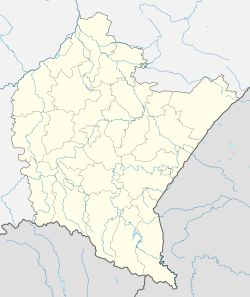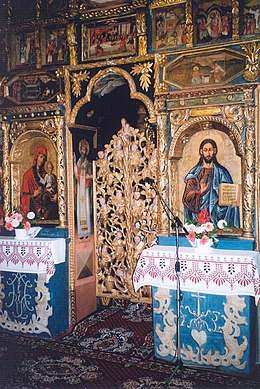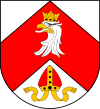Chotyniec
Chotyniec [xɔˈtɨɲet͡s] (Ukrainian: Хотинець, Khotynets’) is a village in the administrative district of Gmina Radymno, within Jarosław County, in the Subcarpathian Voivodeship of south-eastern Poland, close to the border with Ukraine. It lies approximately 15 kilometres (9 mi) east of Radymno, 26 km (16 mi) east of Jarosław, and 74 km (46 mi) east of the regional capital Rzeszów.[1] It lies on the Route of Wooden Architecture.
Chotyniec | |
|---|---|
Village | |
Greek Catholic church | |
 Chotyniec  Chotyniec | |
| Coordinates: 49°57′N 23°1′E | |
| Country | |
| Voivodeship | Subcarpathian |
| County | Jarosław |
| Gmina | Gmina Radymno |
| Population | 340 |
| Official name | Chotyniec-Tserkva of the Birth of the Blessed Virgin Mary |
| Part of | Wooden Tserkvas of the Carpathian Region in Poland and Ukraine |
| Criteria | Cultural: (iii), (iv) |
| Reference | 1424-002 |
| Inscription | 2013 (37th session) |
| Area | 0.67 ha (1.7 acres) |
| Buffer zone | 4.34 ha (10.7 acres) |
The village has a population of 340. Before the Second World War, the population of Chotyniec was mainly Ukrainian. After Operation Vistula in 1947, only 740 inhabitants were left. After 1956, a number of Ukrainian families started to return.
Cerkiew (Wooden Church) of the Holy Mother of God
This Ukrainian Greek Catholic Church, probably founded in 1617, is one of the few still active Greek Catholic churches in Poland that survived both World War II and the deportations afterwards. The church has been renovated a number of times (e.g. in 1733 and 1858), and was closed from 1925 until 1947. It then became a Roman Catholic church until somewhere in the 1980s, when it was abandoned. After the fall of Poland's communist regime it became a Ukrainian Greek Catholic church again. It was extensively restored between 1991 and 1994, mostly paid for by local parishioners.
The building is of distinguished originality because of its harmonious, solid appearance. Inside, a complete iconostasis can be seen, as can a Baroque painting of the last judgment from 1735.
In 2013 Church was inscribed onto UNESCO World Heritage Site list.

